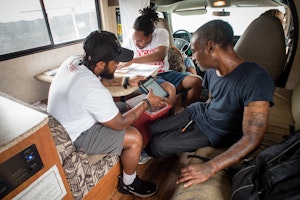Calling for UN Leadership on Women’s Property Rights
By Tamar Ezer
Every year, advocates from around the world convene in New York at the United Nations headquarters for the annual meeting of the Commission on the Status of Women (CSW). This meeting is the principal global policymaking body dedicated to the promotion of gender equality and the advancement of women.
At this meeting, representatives of member states evaluate progress, set global standards and priorities, and formulate policies. Every year the meeting culminates with the adoption of “agreed conclusions” on a specific theme.
However, this year was not like the others. Member states were unable to reach agreement on this year’s theme of empowerment of rural women.
When according to UNICEF, women perform 66 percent of the world’s work and produce 50 percent of food, but only earn 10 percent of the world’s income and own only 1 percent of property, it is a great shame that CSW cannot provide leadership to address this injustice. Moreover, as explained by the Commission on Legal Empowerment of the Poor, supported by the United Nations Development Programme (UNDP), “Even when women do have legal property rights, their actual control of land may be tenuous, since men often mediate access.” Immediate action is needed to rectify this abysmal state of affairs. After all, ensuring women’s rights to ownership of property and control over productive assets is increasingly recognized as a critical step towards achieving the Millennium Development Goals (MDGs). As UN Women has stated, “Women make up more than half the world’s population, but the majority of them live in poverty. For their lives to change, they need access to and control of economic resources and political power.”
This situation is particularly severe in the context of HIV/AIDS. As the Centre on Housing Rights and Evictions (COHRE) has noted, throughout sub-Saharan Africa, “in many cases, subsequent to the HIV/AIDS related deaths of male partners or disclosure of their HIV/AIDS status, women are divested of their marital property, inheritance rights, livelihoods, and at times even their children, by relatives who forcibly evict them from their homes.” Women’s inability to own, dispose of, and inherit property creates economic dependence on men. They may be trapped in abusive relations where they are less empowered to protect themselves from HIV infection or seek treatment, or they may face increased vulnerability upon a husband’s death and forced to participate in widow inheritance, polygyny, or high-risk work to survive. Impoverished women also have reduced capacity to cope with the disease.
Since 2008, advocates concerned about protecting women’s property rights and intersection with HIV/AIDS have used the opportunity of CSW to gather together and strategize on how best to strengthen work in this area. This year’s CSW seemed like a breakthrough when these issues finally penetrated the mainstream discussion at the UN. This had not happened in over a decade. However, CSW ended disappointingly when member states disbanded without putting forth a roadmap for future action.
A number of UN human rights treaties and instruments include protection for women’s housing, land, and property rights. However, there is little accountability for member states who do not abide by these obligations. At this year’s CSW, the Open Society Foundations, the Huairou Commission, and COHRE, in collaboration with UNDP, launched a manual, Tools for Change: Applying UN Standards to Secure Housing, Land, and Property Rights in the Context of HIV, providing tools and examples for translating these standards into advocacy at the local level.
We call upon the UN to build on this work and show leadership at the global level to end state impunity for violations and convert standards into action that impact women’s reality. Addressing this issue should be prioritized in UN programs, such as the 2011 UN Women small grants, and the UN should call for the following actions by member states:
- Repeal and amend discriminatory provisions, bringing national legal frameworks in line with the Convention on the Elimination of All Forms of Discrimination against Women (CEDAW).
- Ensure that women can legally enter into contracts concerning land, housing tenure, and property rights on an equal basis with men.
- Recognize women’s joint ownership of marital property and automatic possession of the marital home upon the death of a spouse, and recognize women’s indirect contributions to the acquisition of property.
- Eliminate discrimination against women and girls in all matters related to inheritance.
- Redress discriminatory aspects of customary laws and strengthen aspects of customary law that protect the rights of women. States should ensure that the application of customary law does not interfere with the basic right of women and girls to equality, including in matters related to land, housing, and property.
- Provide mechanisms to enforce these rights and remedies for violations. This can take the form of legal services integrated into health and economic empowerment programs, community mediation, and work with cultural legal structures to enable women to access justice.
- Address within national HIV/AIDS strategies women’s inequality and gender-specific vulnerability to HIV, specifically allocating resources to programs that increase women’s access to land, housing, and property.
- Implement land governance and reform programs that prioritize women’s participation and give women equal rights with men over land.
Only if these steps are taken will women have access to the economic resources that are critical to realization of their basic rights and their development.
Until June 2016, Tamar Ezer was deputy director of the Law and Health Initiative of the Open Society Public Health Program.

